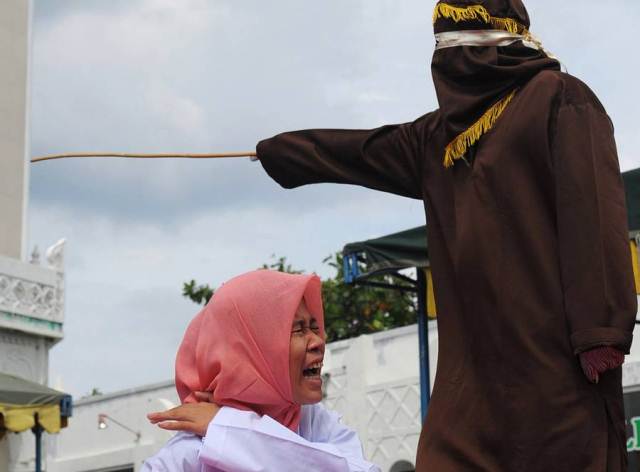An Indonesian woman has been caned in front of a jeering crowd after being accused of “standing too close to her boyfriend”.
The woman, who has not been identified, was among 13 people flogged in Aceh province on the western island of Sumatra for allegedly breaking strict Islamic laws, which ban intimate behaviour such as touching, hugging, and kissing between unmarried people.
Photographs of the young woman crying out in pain have been shared by local and international media, amid growing concerns over the rising number of people — particularly women — subjected to corporal punishment in the region.
Indonesia is the world’s most populous Muslim-majority country, but Aceh is the only province which imposes sharia law.
People in the region can be flogged for a number of “offences”, including gambling, drinking alcohol, and gay sex, in addition to any consensual sex outside of marriage.
Seven men and six women aged between 21 and 30 were punished on 17 October at a mosque in the provincial capital of Banda Aceh, after six couples were found guilty of getting “too close” out of wedlock.
Another man was caned for allegedly “spending time with a member of the opposite sex in a hidden location in a fashion that could lead to adultery”.
Only one of the group due to be flogged, a 22-year-old woman, was granted a temporary reprieve, because she was pregnant.
Aceh Deputy Mayor Zainal Arifin said she would still be caned, but her sentence would be suspended until after she had given birth.
The official added that he hoped the canings would serve as a deterrent.
Aceh began implementing sharia law after being granted special autonomy in 2001, in an attempt by the central government in Jakarta to quell a long-running separatist insurgency.
In October 2015, regional authorities added a new passage to the Aceh Islamic Criminal Code, criminalising consensual sexual relations outside of marriage.
The UN Human Rights Committee and other human rights bodies raised concerns about laws criminalising “adultery” and other consensual sexual relations outside marriage, saying they violate the right to privacy.
Amnesty International said the law would be particularly detrimental to women.
“Laws concerning ‘adultery’ are discriminatory and have a disproportionate impact on women,” the organisation said in a statement.
“Social expectations regarding ‘appropriate’ behaviour for women and discriminatory attitudes that seek to control women’s sexuality mean that women and girls are more likely to face arrest and prosecution for these so-called ‘crimes’”.
The group added that 108 people had been caned in Aceh for gambling, drinking alcohol or “adultery” by the end of 2015.
Source: Independent




